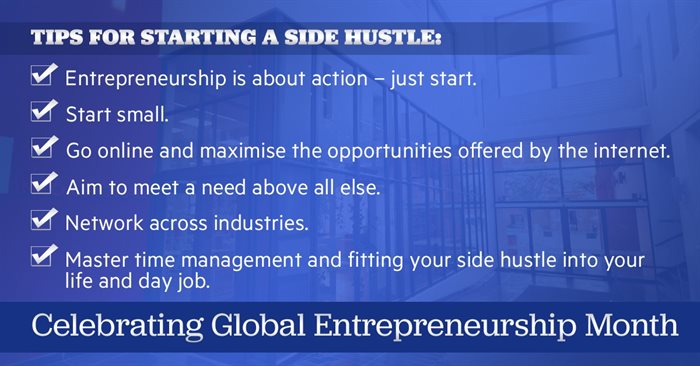Hustling has traditionally been a means for South Africans to make it through the month. Even those in full-time employment increasingly hustle on the side - for an additional income stream to their monthly salary. What's new is that a growing number of middle and higher-income earners in South Africa are turning to side hustles to supplement their nine-to-five jobs.
Thirty percent of middle-class adults (those with a monthly household income of R10,000 and above) have side hustles such as running small businesses, home industries and jobs that are completely different from their main employment, according to the 2021 BrandMapp consumer insight survey.
In fact, the Old Mutual Savings and Investment Monitor found that 51% of working metropolitan households in 2022 have multiple income streams, including side hustles (up from 47% in 2021).
All this entrepreneurial activity is music to the ears of GIBS Prof Kerrin Myres, an expert in entrepreneurship. ‘In academia, we call this “hybrid entrepreneurship”, which means being employed and running an entrepreneurial business at the same time,’ she says. Not to be confused with multiple entrepreneurial activities without the employment element – that would be a ‘gig’ and make you a ‘slasher’ (slang referring to the ‘slash’ separating job titles, as in writer/copy editor/translator).
‘Everybody with a job and some skills should have a side hustle,’ says Myres. There are many reasons for this, including higher success rates. She refers to World Economic Forum data, which found that businesses started ‘on the side’ are 33% less likely to fail than businesses started by someone without a job. In essence, a side hustle is something extra – the ‘cream on top’ as it’s been called because it should add to your life rather than subtract from it.
The why
Globally, Myres has seen a shift in the motivation for starting side hustles. Traditionally, the main job used to act as a safety net in case the side hustle didn’t work out and to finance the venture; now the side hustle is the safety net in case the main job doesn’t work out. ‘Times are tough and corporate jobs uncertain. So people start a business on the side to have something to fall back on if they get retrenched or if the employer goes out of business,’ she says.
Unfortunately, many employed South Africans can’t sustain this backup plan as they need the extra cash now simply to make ends meet. GIBS Prof Adrian Saville considers the rise in middle-class side hustlers ‘a concerning trend’, reflecting the acute financial pressure on South African households. Economic forces behind this include elevated inflation levels, high unemployment rates, and lack of economic growth, combined with a wafer-thin social welfare net.
Amid the gloom, Saville points out, ‘As much as all of this entrepreneurial activity is happening in our stressed circumstance, it means that things are going on, which means that unofficially things are better than the official statistics say.’
And, although for many South Africans the side hustle is a necessity- rather than passion-driven, it still has a positive impact on employability. Starting a side hustle implies resourcefulness and determination while providing work experience, which all make you more attractive to future employers.
Saville speaks from experience. While studying for his PhD, he launched an investment service on the side, which enabled him to gain commercial work experience and improve his CV. He says, ‘That basic experience gave me the foundation to license an investment management firm, which grew to become an institutional investment management business. So my side hustle became a substantial business.’
This is not the norm but does happen: Nic Haralambous, author of How to Start a Side Hustle, published a global list of ‘51 businesses that started as side hustles’. These include local success stories such as online kitchenware shop Yuppiechef and White on Rice, an origami paper-folding firm that has worked with big brands such as Red Bull, Playstation, Adidas, and Converse. However, Haralambous says, ‘It’s not a side hustle if you’ve raised funding so it can replace your job; that’s a start-up. It’s a side hustle if it adds to your main and existing income stream.’
How to side hustle
- Find a customer - ‘The first step is to find somebody to buy something from you,’ says Myres. ‘Just find the customer, meet their need, get paid, and then do it again. And again.’
- Just start – ‘Entrepreneurship is about action, not planning,’ according to Myres. ‘Don’t sit around dreaming and creating a business plan, that’s five years down the line when you go for growth funding. Just get started.’
- Start small - Choose a side hustle that isn't going to take a lot of money or effort to start. Don’t take out a loan or learn a new skill from scratch for it.
- Manage time – Be realistic (and consistent) about fitting a side hustle into your life and day job. Talk to friends and family to get buy-in.
- Go online - You can literally start a business on the internet within a few hours for free. Online marketing, payments and logistics – it’s much easier than it ever was before.
- Network – Be open, as the best ideas sometimes come from people in completely different industries. Myres says, ‘Successful entrepreneurs often network continuously and energetically, and have multiple memberships of different networking organisations to talk to a diverse range of people.’
- Cut red tape – ‘Don’t assume you have to register your side hustle,’ she advises. It costs time and money, so rather find out the thresholds for registration and taxation and only do it once it’s legally necessary.
- Self-sustaining – If your salary still continuously supports your side hustle after three to five years, Myres suggests to should close it down and start something self-sustaining.
Importantly, you don’t necessarily need a brilliant product or service to earn extra cash, as long as you are consistent and determined. As Haralambous says, ‘Side hustles that blow my mind are often less about the idea and more about the resilience of the people who are building these ideas.’


































